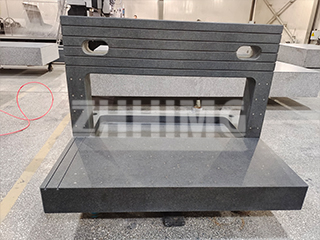With the rapid advancement of industrial manufacturing, granite and marble machine bases have become widely used in precision equipment and laboratory measurement systems. These natural stone materials—especially granite—are known for their uniform texture, excellent stability, high hardness, and long-lasting dimensional accuracy, having been formed over millions of years through natural geological aging.
However, proper maintenance is crucial to ensure their performance and longevity. Missteps during routine care can lead to costly damage and affect measurement accuracy. Below are some common mistakes to avoid when maintaining granite or marble machine bases:
1. Washing with Water
Marble and granite are porous natural materials. While they may appear solid, they can absorb water and other contaminants easily. Rinsing stone bases with water—especially untreated or dirty water—can lead to moisture buildup and result in various stone surface issues such as:
-
Yellowing
-
Water marks or stains
-
Efflorescence (white powdery residue)
-
Cracks or surface flaking
-
Rust spots (particularly in granite containing iron minerals)
-
Cloudy or dull surfaces
To prevent these problems, avoid using water for direct cleaning. Instead, use a dry microfiber cloth, soft brush, or a pH-neutral stone cleaner specifically designed for natural stone surfaces.
2. Using Acidic or Alkaline Cleaning Products
Granite and marble are sensitive to chemicals. Acidic substances (like vinegar, lemon juice, or strong detergents) can corrode marble surfaces that contain calcium carbonate, leading to etching or dull spots. On granite, acidic or alkaline chemicals may react with minerals such as feldspar or quartz, causing surface discoloration or micro-erosion.
Always use neutral pH stone cleaners and avoid direct contact with corrosive or chemical-heavy substances. This is particularly important in environments where lubricants, coolants, or industrial fluids may accidentally spill onto the machine base.
3. Covering the Surface for Long Periods
Many users place carpets, tools, or debris directly on top of stone machine bases for extended periods. However, doing so blocks air circulation, traps moisture, and prevents evaporation, especially in humid workshop environments. Over time, this can cause:
-
Mold or mildew buildup
-
Uneven color patches
-
Structural weakening due to trapped water
-
Stone degradation or spalling
To maintain the stone’s natural breathability, avoid covering it with non-breathable materials. If you must place items on the surface, make sure to regularly remove them for ventilation and cleaning, and always keep the surface dry and dust-free.
Maintenance Tips for Granite & Marble Machine Bases
-
Use soft, non-abrasive tools (e.g., microfiber cloths or dust mops) for daily cleaning.
-
Apply protective sealants periodically if recommended by the manufacturer.
-
Avoid dragging heavy tools or metal objects across the surface.
-
Store the machine base in temperature-stable and low-humidity environments.
Conclusion
Granite and marble machine bases offer exceptional performance in high-precision industrial applications—but only if maintained properly. By avoiding water exposure, harsh chemicals, and improper coverage, you can extend the life of your equipment and ensure the highest level of measurement accuracy.
Post time: Aug-05-2025

